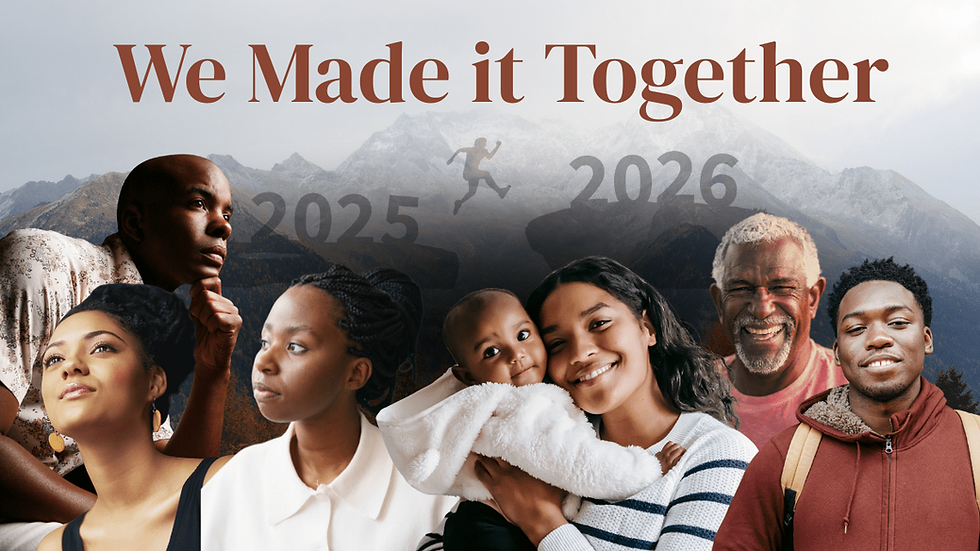Why Black Philanthropists Give: Understanding the Legacy of Black Giving BLACK PHILANTHROPY MONTH
- Oct 13, 2022
- 4 min read
It was a temperate September summer day in Colorado. Then suddenly, I heard shrieks of joy and surprise come from the living room. Startled and intrigued at the same time, I ran at a rapid pace to see what happened. Low and behold, a woman, with an elegant but not pretentious red dress was without preference nor prejudice screaming: “YOU GET A CAR… AND YOU GET A CAR!”
Every emotion was present; reactions from tears spanning all the way to outright shock rippled across the audience. A moment that defined a generation in TV and touched my heart forever. I was only seven years old September 13, 2004, but something significant changed in me that day. I welled with tears, but not over the fact that other people were crying. I was emotional and moved because I recognized that I wanted to help people like that one day. I saw someone who looked like me literally change lives.
Although I was too young at the time to understand the economic impact, accessibility to meaningful employment, generational impact, and scale of impact, I knew that I felt joy witnessing people help other people. This story gives insight into the more glamorous aspects of philanthropy but falls short of reality. I’ve yet to go to a gala, scholarship luncheon, or other event where everyone in the audience receives a free vehicle or a new home.
I have however seen entrepreneurs in the Denver community who have received thousands of dollars in grants that helpedthem scale their organizations. Black men who pool significant resources together to provide hundreds of fully stocked bags with hygiene items at a women’s shelter revealing that there are men out there who care for, serve, and honor women. These anecdotes aside, it begs a question: Why do Black Philanthropists give?
It is no mystery that our community came into this country differently than others did. While some cultures came voluntarily with hopes and dreams of self-actualizing and pursuing a dream, our people were ripped from our heritage with the intention of being slaves - not citizens. Our needs optional at best; our wants nonexistent. Post slavery, those who were able to achieve great or even nominal “success” recognized that there was not a clarion call in society that would result in an outpouring of reparative support for our people. If anyone was going to help us, understand our unique challenges and invest, it was going to be us by and large.
Black philanthropists recognize that our strength comes from within both spiritually and fiscally. The agency and support our community needed and needs is something that unfortunately, in more instances than not, becomes a photo opportunity for one rather than systemic and deep change for many. Herein lies the distinction between CHARITY and PHILANTHROPY. Charity, in practice, is one’s giving that addresses an individual need that results in a change and impact. Philanthropy on the other hand is giving that results in addressing an issue.
My pastor, Toure Roberts shared a sermon on this issue. What’s interesting to note is that in the book of Acts 10:38 the Bible says, “How God anointed Jesus of Nazareth with the Holy Ghost and with power; who went about doing good and healing all who were oppressed of the devil; God was with Him…” While there is much that can be exegeted from the text, the significant portion of the scripture is based on the notion of “doing good.”This phrase when translated is the Greek word philanthropy:“philos” meaning love and “anthropos” meaning the love of humanity.
What is so powerful about Black philanthropy, particularly interwoven with our historical roots in the Black church, is the integrity of the meaning and symbol it represents. Our community, whether in the Black church, our schools, our neighborhoods is a space where PHILANTHROPY in its truest and less grandiose sense is fulfilled daily. It’s the scholarship fund being raised for a young man or young woman of great potential to help them get to college. It’s the family at the grocery store who sees the single father putting back groceries because of the balance and pays for the whole order so he can provide at the level of their needs, not at the level of resources. It’s the successful business owner who pays off an entire graduating class’s student loan debt thus giving them a footing in life that will forever impact their trajectory. PHILANTHROPY: activity that solves an issue.
Black philanthropists give because we recognize that as we pursue justice and equality broadly, we ALL, regardless of our respective levels can give and render collective impact. It took me a while to learn this concept. That transformative September summer day, while inspirational, gave me the wrong expectation. I thought I had to be Oprah or on Oprah’s level to make a difference. It wasn’t until some brothers who looked like me, wrapped their arms around a young 20 something year old,and revealed that TOGETHER with their contribution and mine, we could all do something of significance. Little did I know that the Denver African American Philanthropists (DAAP) would be the seed fund to catalyze the creation of BRIC; a fund that will scale far beyond DAAP’s achievements to date but whose origins are forever inextricably bound.
I hope we all recognize the need for us to contribute to OUR issues and OUR needs; we are all we have. And as Dr. Martin Luther King shared so profoundly in his speech about the “drum major instinct,” all of us have opportunity to aspire to the highest level of greatness… A SERVANT WHO GIVES.
Charles Gilford, III Denver African American Philanthropists (DAAP) Member Director of Regional Affairs for the City and County of Denver






Comments